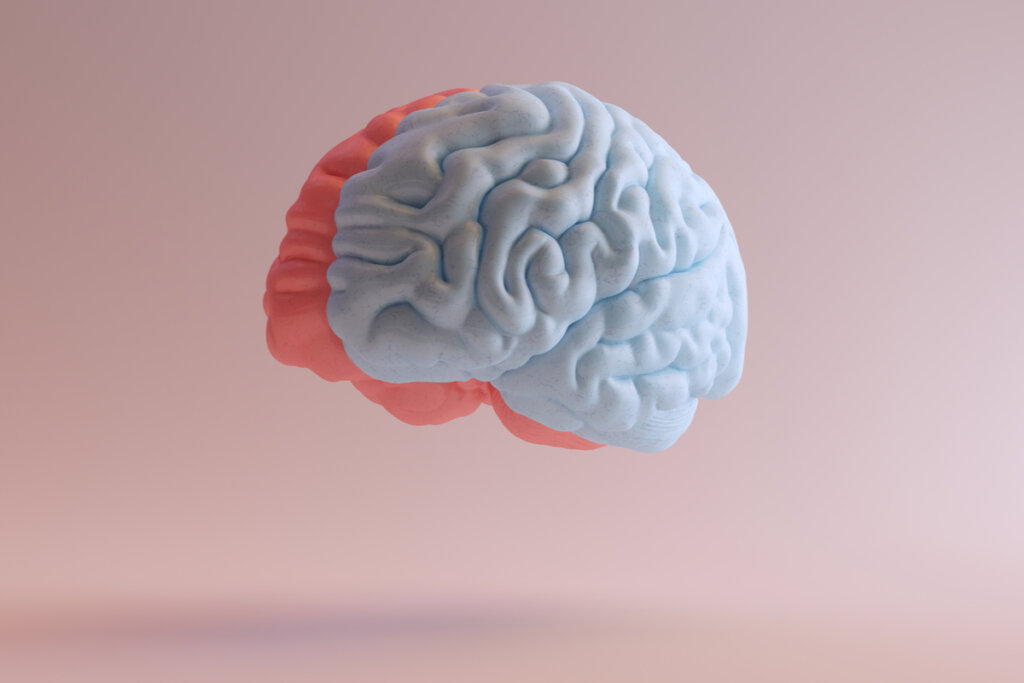Scientists Claim Anorexia Can Alter Brain Structure


Written and verified by the psychologist Valeria Sabater
The pandemic marked the starting point of a worrying trend: an increase in hospital admissions for eating disorders (EDs). They’re even occurring in children under 12 years of age. It must be remembered that anorexia isn’t just any psychological condition. What’s more, we now know that anorexia can alter brain structure.
Anorexia is a clinical reality with a significant impact on the patient’s health. It also impacts family members who are witnesses to the sufferer’s physical decline, loss of muscle mass, dehydration, dry skin, hair loss, fainting, and permanent fatigue.
Many of these young people are reluctant to ask for help. It’s often a lack of awareness of the disease along with the fact of gradually drifting into depressive states and distorted thoughts that stop them from seeking assistance. However, if anorexia isn’t treated from the beginning, serious sequelae can permanently remain.

Anorexia can alter brain structure
This is a recent discovery. It came about thanks to a detailed study conducted by the University of Bath (UK) which was supported by various international organizations. In this project, 2000 pre-existing brain scans of people with and without anorexia were analyzed.
Some of them were in the recovery stage and following healthy lifestyles. Lead researcher, Dr. Esther Walton, from the Department of Psychology at the University of Bath, explained that the study was a long and painstaking job. Universities and medical centers from all over the world collaborated in the process. They uncovered some extremely revealing information.
Experts warn that it’s crucial for patients to recover their weight safely, thus reducing the impact that starvation itself can have on both the body and the brain.
Shrinking of the brain due to anorexia and its effects
The first indicator of the effects of anorexia on the brain that the study found was a reduction in cortical surface, thickness, and subcortical volume. In other words, a reduction in gray matter, and a loss of brain cells and the connections between them. It means a smaller overall volume of the brain.
This brain area is key in the distribution of nervous information. It acts as a switchboard and as a directory of everything that happens in the brain: movements, memory, emotions, communication, decision making, etc.
At the neurological and behavioral level of sufferers of anorexia nervosa who don’t receive treatment, are the following symptoms:
- Reduction of oxygen in the brain.
- Alteration of neurotransmitters.
- Increased risk of developing early dementias.
- Appearance of seizures and restless legs syndrome.
- Altered response in brain regions that are part of the reward circuitry.
- Obsessive, irrational behaviors and difficulty thinking as a consequence of these neurological alterations.
Therefore, we now know that anorexia can alter brain structure, but why does this happen? Even more importantly, is it irreversible?
The cause of the brain alteration
Shockingly, the researchers discovered that anorexia affects the brain more than any other psychiatric condition. We know that depression, obsessive-compulsive disorder, stress, and schizophrenia alter various brain regions. However, this discovery highlights the severity of eating disorders (EDs).
The reason for the reduction in the gray matter lies in the body mass index (BMI). In fact, high malnutrition alters the patient’s neurobiology, weakening it slowly and progressively.
Starvation causes the body to urgently take nutrients from the muscles and even the heart. If the person suffers from anorexia for a long time, the neurons of the gray matter gradually break down.

Early treatment reduces brain abnormalities
Knowing that anorexia can alter brain structure is alarming. It’s also shocking to learn that the health of these boys and girls can translate into chronic consequences, such as kidney, bone, or heart problems. In all cases, early attention to the disorder is decisive. In fact, not only can all these alterations in health be avoided, but any brain damage can be reversed and the gray matter can recover its original density.
The researchers found that large reductions in brain structure were recovered as the patient progressed through therapy and recovery. Therefore, it’s vital to emphasize once again the importance of early care for this type of eating disorder.
The remission of anorexia will only come if the sufferer undertakes a multidisciplinary treatment program. In these plans, the nutritional aspect, psychological therapy (individual and group), and medical care are combined. It’s often also necessary for antidepressants or antipsychotics to be prescribed. That said, each case is unique and requires personalized attention.
The importance of support
It’s important to bear in mind that anorexia doesn’t only involve problems with eating. It’s a condition in which the sufferer battles issues of self-esteem, self-demand, anxiety, and stress. Furthermore, a patient with an eating disorder (ED) doesn’t always admit that they have a problem, which is why support from the environment is key.
If you have a friend or family member who has a bad relationship with food, be vigilant. Try and make them see their reality and the need to request specialized help. Finally, support them but don’t judge them.
The pandemic marked the starting point of a worrying trend: an increase in hospital admissions for eating disorders (EDs). They’re even occurring in children under 12 years of age. It must be remembered that anorexia isn’t just any psychological condition. What’s more, we now know that anorexia can alter brain structure.
Anorexia is a clinical reality with a significant impact on the patient’s health. It also impacts family members who are witnesses to the sufferer’s physical decline, loss of muscle mass, dehydration, dry skin, hair loss, fainting, and permanent fatigue.
Many of these young people are reluctant to ask for help. It’s often a lack of awareness of the disease along with the fact of gradually drifting into depressive states and distorted thoughts that stop them from seeking assistance. However, if anorexia isn’t treated from the beginning, serious sequelae can permanently remain.

Anorexia can alter brain structure
This is a recent discovery. It came about thanks to a detailed study conducted by the University of Bath (UK) which was supported by various international organizations. In this project, 2000 pre-existing brain scans of people with and without anorexia were analyzed.
Some of them were in the recovery stage and following healthy lifestyles. Lead researcher, Dr. Esther Walton, from the Department of Psychology at the University of Bath, explained that the study was a long and painstaking job. Universities and medical centers from all over the world collaborated in the process. They uncovered some extremely revealing information.
Experts warn that it’s crucial for patients to recover their weight safely, thus reducing the impact that starvation itself can have on both the body and the brain.
Shrinking of the brain due to anorexia and its effects
The first indicator of the effects of anorexia on the brain that the study found was a reduction in cortical surface, thickness, and subcortical volume. In other words, a reduction in gray matter, and a loss of brain cells and the connections between them. It means a smaller overall volume of the brain.
This brain area is key in the distribution of nervous information. It acts as a switchboard and as a directory of everything that happens in the brain: movements, memory, emotions, communication, decision making, etc.
At the neurological and behavioral level of sufferers of anorexia nervosa who don’t receive treatment, are the following symptoms:
- Reduction of oxygen in the brain.
- Alteration of neurotransmitters.
- Increased risk of developing early dementias.
- Appearance of seizures and restless legs syndrome.
- Altered response in brain regions that are part of the reward circuitry.
- Obsessive, irrational behaviors and difficulty thinking as a consequence of these neurological alterations.
Therefore, we now know that anorexia can alter brain structure, but why does this happen? Even more importantly, is it irreversible?
The cause of the brain alteration
Shockingly, the researchers discovered that anorexia affects the brain more than any other psychiatric condition. We know that depression, obsessive-compulsive disorder, stress, and schizophrenia alter various brain regions. However, this discovery highlights the severity of eating disorders (EDs).
The reason for the reduction in the gray matter lies in the body mass index (BMI). In fact, high malnutrition alters the patient’s neurobiology, weakening it slowly and progressively.
Starvation causes the body to urgently take nutrients from the muscles and even the heart. If the person suffers from anorexia for a long time, the neurons of the gray matter gradually break down.

Early treatment reduces brain abnormalities
Knowing that anorexia can alter brain structure is alarming. It’s also shocking to learn that the health of these boys and girls can translate into chronic consequences, such as kidney, bone, or heart problems. In all cases, early attention to the disorder is decisive. In fact, not only can all these alterations in health be avoided, but any brain damage can be reversed and the gray matter can recover its original density.
The researchers found that large reductions in brain structure were recovered as the patient progressed through therapy and recovery. Therefore, it’s vital to emphasize once again the importance of early care for this type of eating disorder.
The remission of anorexia will only come if the sufferer undertakes a multidisciplinary treatment program. In these plans, the nutritional aspect, psychological therapy (individual and group), and medical care are combined. It’s often also necessary for antidepressants or antipsychotics to be prescribed. That said, each case is unique and requires personalized attention.
The importance of support
It’s important to bear in mind that anorexia doesn’t only involve problems with eating. It’s a condition in which the sufferer battles issues of self-esteem, self-demand, anxiety, and stress. Furthermore, a patient with an eating disorder (ED) doesn’t always admit that they have a problem, which is why support from the environment is key.
If you have a friend or family member who has a bad relationship with food, be vigilant. Try and make them see their reality and the need to request specialized help. Finally, support them but don’t judge them.
All cited sources were thoroughly reviewed by our team to ensure their quality, reliability, currency, and validity. The bibliography of this article was considered reliable and of academic or scientific accuracy.
- Esther Walton, Fabio Bernardoni, Victoria-Luise Batury, Klaas Bahnsen, Sara Larivière, Giovanni Abbate-Daga, Susana Andres-Perpiña, Lasse Bang, Amanda Bischoff-Grethe, Samantha J. Brooks, Iain C. Campbell, Giammarco Cascino, Josefina Castro-Fornieles, Enrico Collantoni, Federico D’Agata, Brain Structure in Acutely Underweight and Partially Weight-Restored Individuals with Anorexia Nervosa – A Coordinated Analysis by the ENIGMA Eating Disorders Working Group. Biological Psychiatry, 2022; DOI: 10.1016/j.biopsych.2022.04.022
This text is provided for informational purposes only and does not replace consultation with a professional. If in doubt, consult your specialist.







